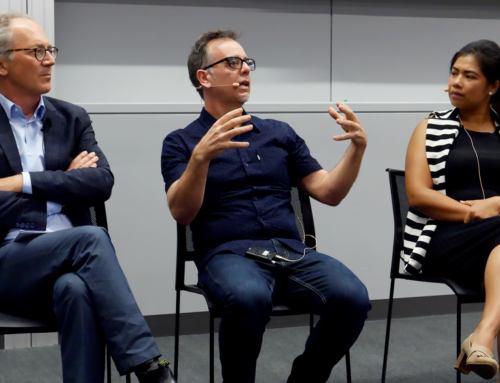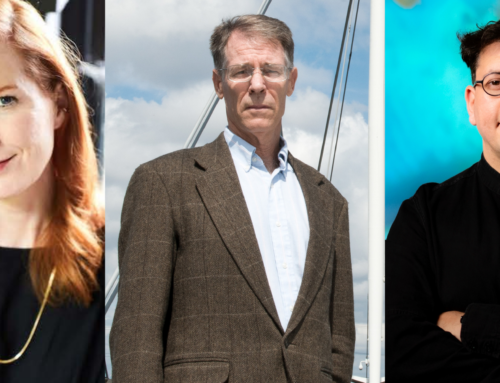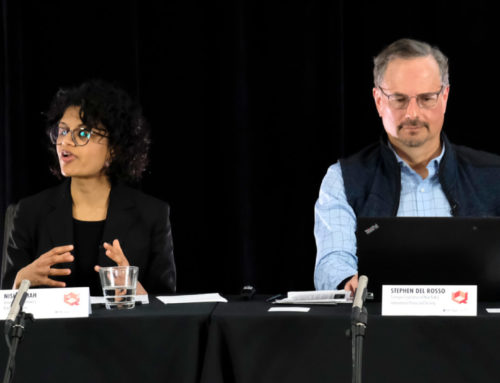Each of the Q Symposium’s Global Security panel on Saturday afternoon served to show that discussing elements of the global now necessitates consideration of the complex, the entangled, and the unpredictable. With a subtitle of “Crisis, Stasis, or Opportunity?” the panel’s presentations on East Asian nuclear security, the “cohesion” of the American military, maritime piracy in the Indo-Pacific, and global climate change all explored long-entrenched orders increasingly under challenge by changing parameters. But while each presentation stressed the challenges posed by changes to these institutions, they were careful to show the opportunities inherent in the change as well.
Moderator Roy MacLeod, of USydney’s Centre for International Security Studies, introduced the panel’s participants to kick things off. The trans-Pacific panel’s roster boasted three North American transplants to Australia and one San Francisco-based Australian, lending credence to the theory of the quantum citizenry of expatriates that had been brought up in Parag Khanna’s presentation the day prior.
Peter Hayes, director of the Nautilus Institute, started things off with his presentation on evolutions in the nuclear stalemate in the Korean peninsula. Hayes’s combined expertise in energy politics, proliferation issues, and his extensive experience in the region enabled him to make a multi-faceted presentation touching on an array of interrelated issues of security. North Korea’s continued nuclearization and the succession of Kim Jong-Un and the economic and social expansion of both South Korea and China increase the strain on the already tenuous stalemate on the peninsula, while technological innovations increase the probability of increasingly complex WMD threats. According to Hayes, the complex problems of the Korean peninsula are now “multiplex” problems in which social, economic, and security issues are irrevocably entangled in a single geographic locale.

Peter Hayes (Nautilus Institute, second from right) presents, as fellow presenters Sarah Percy, Megan Mackenzie, David Schlosberg, and moderator Roy MacLeod (L-R) look on. (Photo: Jose Torrealba)
But just as a proliferating peninsula lives under a shadow of “mutually probable destruction,” the shape of security is mirrored by the increasingly entangled social and economic ties and networks. New potentialities for security are entangled with increasing connectivity of civil society; half a billion newly networked internet users in China, green-growing South Korea, and a DPRK more integrated with the Chinese economic booms all contribute to a multiplex network in which hybrid, horizontal social engagement strategies lead regional actors to pursue strategies appearing more like those of “mutual life” seen in Go (or baduk, in Korean) rather than zero-sum annihilation.
In the second presentation, USydney and CISS’s Megan Mackenzie shared her research on the American military and its attempts as an institution to cope with the challenge posed by Iraq and Afghanistan to its identity. Her presentation started by paying heed to the intellectual genealogy of “unit cohesion”- a concept that has bewitched both practitioners and academics alike. Long considered one excuse to keep in place “the combat exclusion” of women from front-line positions, Mackenzie’s work on women in the military had brought her into consistent contact with an institution in flux, struggling to cope with defeat, deployment fatigue, and damaging scandals running the ranks from Gen. McChrystal to Spc. England.
How does an institution like the US military cope with these changes? Mackenzie touched on a number of policy shifts, including the repeal of Don’t Ask, Don’t Tell and the lifting of the aforementioned combat exemption for women. But Mackenzie made a point of asking “How do you change a policy that doesn’t exist?” Her point drove home that the demands of asymmetric warfare in the Global War on Terror had already forced women into combat, with the publicity surrounding the combat exemption part of a larger re-imagination of the military’s identity along with efforts to rebrand soldiers as skilled technicians. In her closing, Mackenzie left her mark a symposium already showing a repeated emphasis on imagery, with slides showing convicted PFC Chelsea (née: Bradley) Manning before and after her transition representing the military’s identity crisis in a quite tangible way.
In her presentation on the particular security challenges of the maritime, the University of Western Australia’s Sarah Percy made a presentation which tied in with another of the conference’s recurrent themes. For her, the maritime is a vast expanse of uncertainty and entanglement in which human trafficking, piracy, smuggling, and illegal fishing combine to present an unpredictable, Hydra-headed threat. This hybridization leads to criminal-security threats; states are policing security threats while criminal activities are increasingly fought with militarized responses. Percy perceives four main consequences of this process: criminals consistently evolve in technology and tactics, the securitization of crime results in increased violence, the proceeds of crime play larger economic roles, and international responses become more and more cooperative and coordinated.
The maritime, she stressed, is an unusual space on account of these issues. It is simultaneously one of the most and least governed spaces on the planet. Maritime law is almost the Newtonian physics of statecraft- classical, state-centric, and based on primarily physical considerations of geography. But beyond, between, and beneath these legislated spaces are spaces of exception and exemption, either lawless or overlaid with complex or even paradoxical sovereignty claims. The resulting interactions between the exercise of state power and the hybridization of security threats are increasingly unpredictable, with pirates popping up across vast expanses of ocean and increasingly violent confrontations. To close, Percy pointed to a major problem for policymakers: the correlation of factors and unpredictability make it difficult to discern just how and why state efforts against such threats are or are not successful.
The panel’s last participant, David Schlosberg of USydney, began by informing the audience that he did not consider himself a security scholar, or even an environmental scholar. He went on, saying that his pessimism regarding humanity’s ability to cope with man-made climate change has made him feel like the resident wet blanket of his conference appearances.

Moderator Roy MacLeod puts a question to the Q Symposium’s Global Security Panel. (Photo: Jose Torrealba)
But in the spirit of the conference, he had been thinking about the quantum metaphor and its applicability to climate change issues. Schlosberg said that he had initially been at a loss to understand its applicability. Where other scholars at the conference had borrowed from the Copenhagen interpretation and emphasized the impact of observation in changing phenomena, Schlosberg pointed out that climate change has been consistently observed and successfully predicted, with the support of a broad scientific consensus. It is not a “black swan” or an unknown unknown but a known known, identified and understood the world over (with a few unfortunately notable exceptions). With climate change, unpredictability is not the problem- power is. Schlosberg opined that in regards to climate change, humanity and politics are faced not with the quantum leaps of physics but biology’s slow violence of evolution.
Each presentation painted a picture of a long-standing institution or set of institutions faced with complex challenges. Where Hayes sees potentials for peace in the increasingly entangled networks along a Pacific littoral, Schlosberg presented a problem of old-fashioned mass and momentum in which it seems observation will not alter the state of state inertia on climate issues. Where Mackenzie focused on one of the largest and most complex social organizations on earth, Percy portrayed a similar complexity characterizing the diffuse networks that crisscross the vastest of natural spaces. While each drew their own conclusions about the utility of any potential quantum turn, they each emphasized that change brings with it both challenge and opportunity. As demonstrated at the conference throughout, so does the idea of a quantum security studies.







[…] slunk softly towards a Sydney summer sundown. Panels had touched on so many facets of security studies, natural and social science, ethics, epistemology, and security aesthetics that a single closing […]